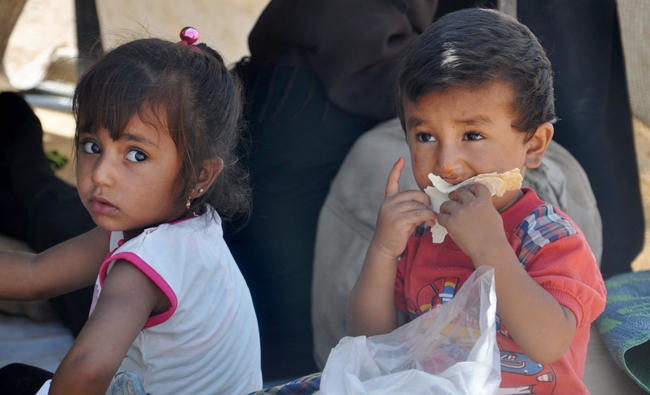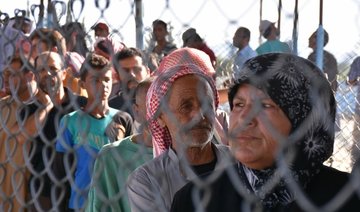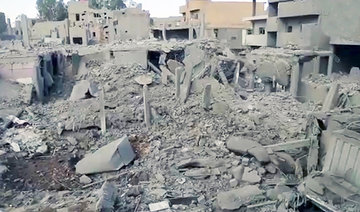BAGHDAD: Despite the recapture of swathes of territory from Daesh, the conflicts in Iraq and Syria are far from over as their governments face major political challenges, experts warn.
In July, the terrorists lost control of Iraq’s second city Mosul in a major setback three years after declaring a “caliphate” straddling the two countries.
Across the border around half of Daesh’s de facto Syrian capital Raqqa has been retaken by US-backed fighters.
But divisions across political, religious and ethnic lines will again rise to the surface in Iraq after the extremist group is driven out of its last bastions, said Mathieu Guidere, an expert on terrorist organizations.
A month before Iraq declared the liberation of Mosul, the country’s autonomous Kurdish region announced plans to proceed with a referendum on statehood in September.
The idea was not new but its timing was criticized by Baghdad, which opposes Kurdish independence, and by Washington, coming as it did with the anti-Daesh campaign still unfinished.
Analysts said the referendum is one of the many challenges facing the Iraq government along with the presence of a Shiite paramilitary force in Sunni-majority areas and the fate of minorities such as the Yazidis.
How the government deals with these thorny issues will determine whether it succeeds in a post-IS era, experts said.
The terrorist group “is the illustration — violent, long and complex — of the dystrophy that reigns in Iraq,” said Mohammad-Mahmoud Ould Mohamedou, professor of international history at Geneva’s Graduate Institue.
Ould Mohamedou advocates a “new national covenant” for Iraq that would allow the Shiite-dominated government to gain the trust of the Sunni population and other minorities, particularly in the northern Mosul region.
At the same time the government will also have to skilfully deal with the paramilitary Hashed Al-Shaabi umbrella organization which is dominated by Iran-backed Shiite militias.
Some of the components within Hashed Al-Shaabi, which battled Daesh in Iraq, have for years been sending fighters to support the Syrian regime in its conflict with various rebel groups.
Even as leaders in both Iraq and Syria savour the setbacks inflicted by their forces on Daesh, they still need to examine the reasons that led to the formidable rise of the jihadist group.
After declaring “victory over brutality and terrorism” in Mosul, Iraqi Prime Minister Haider Al-Abadi said there were “lessons to be learned” to ensure his country never again falls into the grip of Daesh.
“Huge mistakes have been made,” he said.
Syrian President Bashar Assad also faces huge challenges in the country’s multi-sided war, despite his forces being backed by allies Russia, Iran and the Lebanese Shiite movement Hezbollah in the battle against terrorists and rebels.
Daesh is steadily losing chunks of Raqqa to the Syrian Democratic Forces (SDF), a US-backed Arab-Kurdish alliance which broke into the northern city in June.
A Russian-backed government offensive has also targeted IS forces in the central Syrian desert.
Analysts said that if Raqqa falls, the Kurdish fighters that dominate the SDF could clash with regime troops.
Assad “does not want an autonomous administration” taking control of Raqqa, said Syria expert and geographer Fabrice Balanche.
Ould Mohamedou said the war in Syria “goes beyond the question of Daesh,” having erupted six years ago with peaceful anti-government protests that were brutally put down by the regime.
“In the name of the fight against terrorism, more and more Western governments have closed their eyes to the massacres perpetrated by the Syrian regime,” he said.
The war in Syria has killed hundreds of thousands of people while millions more have been displaced in the two countries.
Rebuilding infrastructure and restoring stability to allow the displaced to return home will be a massive challenge.
The UN has said the level of destruction in Mosul alone is one of the largest and most complex challenges it has faced.
Unless all these challenges are tackled, Daesh terrorists driven out of territory in Syria and Iraq could re-emerge as a more brutal and formidable force.
For Daesh “the key words now are reorganization and redeployment,” said Guidere.
Ould Mohamedou said that even if IS is defeated in Syria and Iraq “it will bounce back elsewhere and... with a new look.”
Conflicts in Syria, Iraq far from over despite Daesh setbacks
Conflicts in Syria, Iraq far from over despite Daesh setbacks

Israel attacks Yemen’s Hodeidah after evacuation warnings, Houthis say

- Strikes came shortly after Israel warned residents of Ras Isa, Hodeidah and Salif to leave, saying the ports were being used by the Iranian-backed Houthis
HODEIDAH: Israel attacked Hodeidah in Yemen after the Israeli army said it had warned residents of three ports under Houthi control to evacuate, the Houthi interior ministry said on Sunday.
The strikes came shortly after Israel warned residents of Ras Isa, Hodeidah and Salif to leave, saying the ports were being used by the Iranian-backed Houthis.
There was no immediate comment on the attack from Israel.
The strikes came a few days after a missile launched toward Israel by the Houthis was intercepted.
The attack came ahead of US President Donald Trump’s visit to the Middle East this week.
Trump, who had launched an intensified military campaign against Houthi strongholds in Yemen on March 15, agreed to an Oman-mediated ceasefire deal with the group, who said the accord did not include Israel.
The Houthis have been launching missiles and drones at Israel as well as attacking vessels in global shipping lanes, in a campaign that they say is aimed at showing solidarity with Palestinians in Gaza.
Israel has carried out numerous retaliatory airstrikes on Houthi targets in Yemen.
Hamas, Trump envoy say last living US hostage in Gaza to be released in truce efforts

- Envoy Steve Witkoff confirmed that Hamas had agreed to release Edan Alexander as a good will gesture toward Trump
- Alexander is an Israeli-American soldier who grew up in the United States
- Trump has frequently mentioned Alexander, now 21, by name in the past few months
DEIR AL-BALAH, Gaza Strip: Hamas said Sunday that the last living American hostage in Gaza, Edan Alexander, will be released as part of efforts to establish a ceasefire, reopen crossings into the Israeli-blockaded territory and resume the delivery of aid. Two Hamas officials told The Associated Press they expect the release in the next 48 hours.
US President Donald Trump’s envoy Steve Witkoff confirmed late Sunday in a message to AP that Hamas had agreed to release Alexander as a good will gesture toward Trump.
The announcement of the first hostage release since Israel shattered a ceasefire in March comes shortly before Trump visits the Middle East this week. It highlighted the willingness of Israel’s closest ally to inject momentum into ceasefire talks for the 19-month war as desperation grows among hostages’ families and Gaza’s over 2 million people under the new Israeli blockade.
Alexander is an Israeli-American soldier who grew up in New Jersey. He was abducted from his base during the Oct. 7, 2023, Hamas-led attack that ignited the war in Gaza.
Israeli Prime Minister Benjamin Netanyahu’s office said the US informed it of Hamas’ intent to release Alexander “without compensation or conditions” and that the step is expected to lead to negotiations on a truce. Netanyahu’s government was angered by US direct talks with Hamas earlier this year — which led to a Hamas offer to release Alexander and the bodies of four other hostages if Israel recommitted to a stalled ceasefire deal. Days later, however, Israel resumed the war.
Witkoff told the AP that Hamas’ goal in releasing Alexander was to restart talks on a ceasefire, the release of additional hostages and a surge of humanitarian aid into Gaza before Israel carries out a threatened total takeover of the territory.
Khalil Al-Hayyah, a Hamas leader in Gaza, said the group has been in contact with the US administration over the past few days.
Al-Hayyah said in a statement Hamas is ready to “immediately start intensive negotiations” to reach a final deal for a long-term truce, which includes an end to the war, the exchange of Palestinian prisoners and hostages in Gaza and the handing over of power in Gaza to an independent body of technocrats.
Indirect talks between Hamas and the US began five days ago, an Egyptian official and a senior Hamas official told the AP, with both describing the release of Alexander as a gesture of goodwill.
The senior Hamas official, speaking on condition of anonymity because he was not authorized to speak to the media, said Alexander is expected to be released on Monday. Hamas was advised to “give a gift to President Trump and in return he will give back a better one,” the official said.
Another Hamas official, speaking on condition of anonymity to discuss negotiations, said Alexander’s release is expected in the next 48 hours, adding that it requires Israel to pause fighting for a couple of hours.
The Egyptian official involved in ceasefire negotiations, speaking on condition of anonymity to discuss talks, said Hamas received assurances from the Trump administration through Egyptian and Qatari mediators that Alexander’s release “will put all files on the negotiating table” including an end to the war.
Alexander’s parents did not immediately return requests for comment.
Trump and Witkoff have frequently mentioned Alexander, now 21, by name in the past few months. Witkoff was traveling to the region on Monday ahead of Alexander’s expected release.
“Every time they say Edan’s name, it’s like they didn’t forget. They didn’t forget he’s American, and they’re working on it,” Edan’s mother, Yael Alexander, told The Associated Press earlier this year.
Hamas released a video of Alexander in November during the Thanksgiving weekend, his mother said. The video was difficult to watch as he cried and pleaded for help, but it was a relief to see the latest sign that he was alive, she said.
Fifty-nine hostages are still in Gaza, around a third of them believed to be alive. Most of the rest were released in ceasefire agreements or other deals. The Hostages Families Forum, the grassroots forum representing most hostage families, said Alexander’s release “must mark the beginning of a comprehensive agreement” that will free everyone.
Trump, whose administration has voiced full support for Israel’s actions, is set to visit Saudi Arabia, Qatar and the United Arab Emirates this week in a regional tour.
Bombardment continues
Israeli strikes overnight and into Sunday killed 15 people in Gaza, mostly women and children, according to local health officials.
Two strikes hit tents in the southern city of Khan Younis, each killing two children and their parents, according to Nasser Hospital, which received the bodies. Another seven people were killed in strikes elsewhere, including a man and his child in a Gaza City neighborhood, according to hospitals and Gaza’s Health Ministry.
The Israeli military says it only targets militants and tries to avoid harming civilians. It blames Hamas for civilian deaths in the 19-month-old war because the militants are embedded in densely populated areas.
Israel has sealed Gaza off from all imports, including food, medicine and emergency shelter, for over 10 weeks in what it says is a pressure tactic aimed at forcing Hamas to release hostages. Israel in March shattered the ceasefire that had facilitated the release of more than 30 hostages.
Aid groups say the humanitarian crisis is worse than at any time in the war, with food running low.
The war began when Hamas-led militants attacked southern Israel, killing some 1,200 people, mostly civilians, and taking 251 hostage.
Israel’s offensive has killed over 52,800 Palestinians, mostly women and children, according to Gaza’s Health Ministry, which does not say how many of the dead were combatants or civilians. The offensive has destroyed vast areas of the territory and displaced some 90 percent of its population.
Israel recovers remains of soldier killed in Lebanon in 1982
In a separate development, Israel said it retrieved the remains of a soldier killed in a 1982 battle in southern Lebanon after he had been classified as missing for more than four decades.
The Israeli military said Sgt. 1st Class Tzvi Feldman’s remains were recovered from deep inside Syria, without providing further details.
Netanyahu visited Feldman’s surviving siblings and told them that the overthrow of Syrian President Bashar Assad late last year led to an “opportunity” that allowed the military and the Mossad, Israel’s foreign intelligence agency, to gather additional intelligence and locate and retrieve the body, according to video released by his office.
Feldman went missing, along with five other Israeli soldiers, in a battle with Syrian forces in the Lebanese town of Sultan Yaaqoub.
Qatar delivers more than 60,000 tonnes of fuel to Lebanese army

- Delivery is third and final shipment of fuel for 25
- Qatar’s actions indicate its support for the Lebanese people
LONDON: Qatar dispatched more than 60,000 tonnes of fuel to Lebanon on Sunday as part of ongoing efforts to strengthen the country’s security capabilities.
The Qatar Fund for Development delivered the third and final fuel shipment for 2025, which comprised 62,000 tonnes of fuel, to the northern Lebanese port of Tripoli.
The fund stated that the shipment is intended to strengthen the Lebanese army’s operational capabilities and contribute to Lebanon's security and stability, the Qatar News Agency reported.
The delivery is a sign of Qatar’s support for the Lebanese people, as well as a contribution to prosperity and stability in the country, the QNA added.
Palestinian vice president discusses Gaza, West Bank with Qatar’s prime minister

- Hussein Al-Sheikh calls for Palestinian Authority to take on civil, security responsibilities in Gaza
- Qatari official briefed on latest developments in West Bank
LONDON: Hussein Al-Sheikh, the vice president of Palestine, has discussed in Doha the latest developments in the Gaza Strip and West Bank with Qatar’s Prime Minister and Foreign Minister Sheikh Mohammed bin Abdulrahman bin Jassim Al-Thani.
Al-Sheikh spoke of the Palestinian stance on Gaza, calling for the complete withdrawal of Israeli forces from the enclave to allow the Palestinian Authority to take on civil and security responsibilities, the Palestine News Agency reported.
The officials looked at the preparations for the upcoming Arab League Summit in Baghdad and the anticipated visit of US President Donald Trump to the region this week.
Al-Sheikh also briefed the Qatari official on the latest developments in the West Bank, highlighting the urgent need for a ceasefire and the immediate delivery of humanitarian aid to Gaza.
Qatar’s prime minister reaffirmed his country’s strong support for the Palestinian cause, emphasizing the importance of international law and the establishment of a Palestinian state, the WAFA Agency added.
Al-Sheikh was appointed vice president by Palestinian Authority President Mahmoud Abbas after being selected as the deputy chairman of the executive committee of the Palestine Liberation Organization in April.
He met Saudi Crown Prince Mohammed bin Salman, and Foreign Minister Prince Faisal bin Farhan in Jeddah last week during his first regional visit following his appointment.
UK maritime agency reports incident northwest of UAE port

CAIRO: The United Kingdom Maritime Trade Operations (UKMTO) said on Sunday it received a report of an incident 80 nautical miles off the United Arab Emirates’ Jebel Ali port.
UKMTO said a vessel in the area reported a small craft colliding with it and was seen attempting to collide with other vessels in the area, adding that all crew were safe.





















